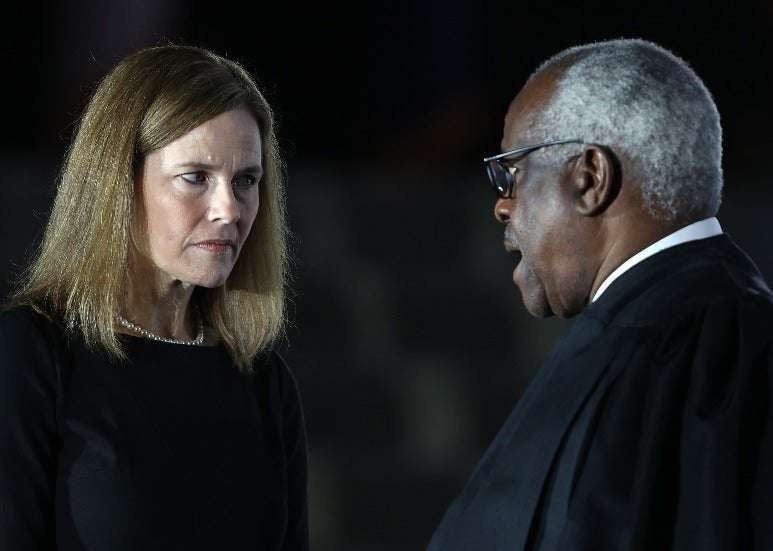When should a Supreme Court justice’s deeply held religious beliefs require recusal — that is, that the justice not participate in a particular case? A difficult question, to be sure, but one that Justice Amy Coney Barrett Amy Coney BarrettPence calls for Roe v. Wade to be sent to 'ash heap of history' ahead of abortion ruling Supreme Court to hear landmark abortion case this week Graham emerges as go-to ally for Biden's judicial picks MORE has already answered for herself. And her answer requires her recusal in abortion cases.
The Supreme Court hears arguments in Dobbs v. Jackson Women’s Health Organization Wednesday, which challenges the constitutionality of Mississippi’s ban on abortions after 15 weeks of pregnancy.
Under current precedent, the law is unconstitutional — as both the district court and the court of appeals held. Both Roe v. Wade, decided in 1973, and Planned Parenthood of Southeast Pennsylvania v. Casey, decided in 1992, hold that a state cannot ban abortions prior to viability, approximately the 24th week of pregnancy. Mississippi has asked the Supreme Court to overrule those precedents.
To follow her own words in a 1998 law review article, Barrett should have recused herself from deciding this case (and all other abortion cases) if she has any integrity at all.
In “Catholic Judges in Capital Cases,” published in the Marquette Law Review, Barrett (then a law clerk to a federal court of appeals judge) and her co-author address the dilemma that faces devout Catholic judges in capital cases. She writes that such judges are “obliged by oath, professional commitment, and the demands of citizenship to enforce the death penalty,” but they are also “obliged to adhere to their church’s teaching on moral matters.” They are therefore “morally precluded from enforcing the death penalty.”
What’s a Catholic judge to do, then? According to Barrett’s article, the judge must recuse herself. She can neither enforce the death penalty and violate her religious conscience, nor fail to enforce it and violate her oath of office.
And even in a case in which a judge has discretion whether or not to sentence a convicted criminal to death, he cannot resolve to keep an open mind and then claim to have done nothing wrong if he decides not to impose the death penalty. Because, Barrett writes, “A judge who suspends his moral judgment during sentencing sets his conscience aside” and “cuts himself loose from his moral moorings.” That unloosing is itself a sin, she concludes — analogous to “looking lustfully at a woman” and thus committing adultery “in his thoughts.”
Barrett’s bottom line is that an “observant Catholic judge” may not “formally cooperate in bringing about the defendant’s execution.” And for that reason, “if one cannot in conscience affirm a death sentence the proper response would be to recuse oneself.” To do otherwise is to “betray a public trust” by manipulating the law “in order to save lives.”
What does all this have to do with abortion? Barrett tells us in the same article that in the context of abortion the case for a Catholic judge’s recusal is even stronger. Unlike the death penalty, the Catholic church’s “prohibitions against abortion and euthanasia are absolute.” And also unlike the death penalty, “abortion and euthanasia take away innocent life.” Abortion, she says, “is always immoral.”
Barrett’s conscience, and her fidelity to the teachings of her church, thus do not allow her to affirm a woman’s right to end her pregnancy, as that would be “formally cooperating” in an absolutely immoral act. But neither may she “betray the public trust” by manipulating constitutional law and precedent “in order to save (unborn) lives.” Nor may she suspend her moral conscience while she decides Dobbs, even if she were able to do so — for that, too, would violate her religious beliefs.
It does not matter that, as a Supreme Court justice, she is entitled to vote to overrule even longstanding precedents like Roe. Even Supreme Court justices are bound by the rule of law. They may not ignore or overrule precedents based solely on their own moral compass. They must instead make their decisions in the context of two centuries of doctrine about the value of precedents, the need to justify any overruling, and the methods of constitutional interpretation generally. And if Barrett relies instead on her “church’s teachings on moral matters,” she is manipulating the law no less than if a judge morally opposed to the death penalty finds a way to avoid imposing it in a particular case.
On Barrett’s own reasoning, then, her only option is to recuse herself. If she does not do so, she is, in her own words, violating her oath of office and betraying the public trust.
Suzanna Sherry is the Herman O. Loewenstein professor of law at Vanderbilt University. She is the author of dozens of books and articles about constitutional law and the Supreme Court.

spaceman757 on December 1st, 2021 at 21:20 UTC »
Whew! They almost had her!
Actual__Wizard on December 1st, 2021 at 19:03 UTC »
Not happening. She was implanted in the court for the sole purpose of making this decision.
TheGibb on December 1st, 2021 at 18:35 UTC »
yeah i'm sure she'll get right on that